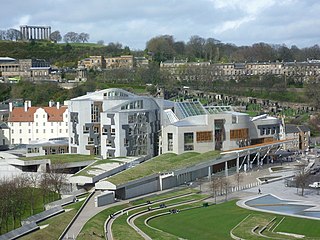
The United Kingdom has three distinctly different legal systems, each of which derives from a particular geographical area for a variety of historical reasons: English and Welsh law, Scots law, Northern Ireland law, and, since 2007, calls for a fourth type that of purely Welsh law as a result of Welsh devolution, with further calls for a Welsh justice system.

Devolution is the statutory delegation of powers from the central government of a sovereign state to govern at a subnational level, such as a regional or local level. It is a form of administrative decentralization. Devolved territories have the power to make legislation relevant to the area, thus granting them a higher level of autonomy.
Home rule is government of a colony, dependent country, or region by its own citizens. It is thus the power of a part of a state or an external dependent country to exercise such of the state's powers of governance within its own administrative area that have been decentralized to it by the central government. Home rule may govern in an autonomous administrative division; in contrast, though, there is no sovereignty separate from that of the parent state, and thus no separate chief military command nor separate foreign policy and diplomacy.

Scottish independence is the idea of Scotland regaining its independence and once again becoming a sovereign state, independent from the United Kingdom. The term Scottish independence refers to the political movement that is campaigning to bring it about.

The Scotland Act 1998 is an Act of the Parliament of the United Kingdom which legislated for the establishment of the devolved Scottish Parliament with tax varying powers and the Scottish Government. It was one of the most significant constitutional pieces of legislation to be passed by the UK Parliament between the passing of the European Communities Act in 1972 and the European Union (Withdrawal) Act in 2018 and is the most significant piece of legislation to affect Scotland since the Acts of Union in 1707 which ratified the Treaty of Union and led to the disbandment of the Parliament of Scotland.

A legislative consent motion is a motion passed by either the Scottish Parliament, Senedd, or Northern Ireland Assembly, in which it consents that the Parliament of the United Kingdom may pass legislation on a devolved issue over which the devolved government has regular legislative authority.
Many entities have been called a Constitutional Commission with the general purpose of reviewing a constitution, or planning to create one.

A post-legislative referendum was held in Scotland in 1979 to decide whether there was a sufficient support for a Scottish Assembly proposed in the Scotland Act 1978 among the Scottish electorate. This was an act to create a devolved deliberative assembly for Scotland. A majority (51.6%) of voters supported the proposal, but an amendment to the Act stipulated that it would be repealed if less than 40% of the total electorate voted in favour. As there was a turnout of 64% the "Yes" vote represented only 32.9% of the registered electorate, and the act was subsequently repealed.
A central government is the government that is a controlling power over a unitary state. Another distinct but sovereign political entity is a federal government, which may have distinct powers at various levels of government, authorized or delegated to it by the federation and mutually agreed upon by each of the federated states. Though inappropriate, the adjective "central" is also sometimes used to describe the government of a federation, such as in India.

The Supreme Court of the United Kingdom is the final court of appeal in the United Kingdom for all civil cases, and for criminal cases originating in England, Wales and Northern Ireland. As the United Kingdom’s highest appellate court for these matters, it hears cases of the greatest public or constitutional importance affecting the whole population.
Constitutional convention may refer to:
The Royal Commission on the Constitution, also referred to as the Kilbrandon Commission or Kilbrandon Report, was a long-running royal commission set up by Harold Wilson's Labour government to examine the structures of the constitution of the United Kingdom and the British Islands and the government of its constituent countries, and to consider whether any changes should be made to those structures. It was started under Lord Crowther on 15 April 1969, Lord Kilbrandon took over in 1972, and it finally reported on 31 October 1973.

The Commission on Scottish Devolution, also referred to as the Calman Commission or the Scottish Parliament Commission or Review, was established by an opposition Labour Party motion passed by the Scottish Parliament on 6 December 2007, with the support of the Conservatives and Liberal Democrats. The governing Scottish National Party opposed the creation of the commission.

Devolution is the process in which the central British parliament grants administrative powers to the devolved Scottish Parliament. Prior to the advent of devolution, some had argued for a Scottish Parliament within the United Kingdom – while others have since advocated for complete independence. The people of Scotland first got the opportunity to vote in a referendum on proposals for devolution in 1979 and, although a majority of those voting voted 'Yes', the referendum legislation also required 40% of the electorate to vote 'Yes' for the plans to be enacted and this was not achieved. A second referendum opportunity in 1997, this time on a strong proposal, resulted in an overwhelming 'Yes' victory, leading to the Scotland Act 1998 being passed and the Scottish Parliament being established in 1999.

The constitution of the United Kingdom or British constitution comprises the written and unwritten arrangements that establish the United Kingdom of Great Britain and Northern Ireland as a political body. Unlike in most countries, no official attempt has been made to codify such arrangements into a single document, thus it is known as an uncodified constitution. This enables the constitution to be easily changed as no provisions are formally entrenched.

The Constitution Society is an independent, non-party educational trust based in Westminster, London. It was established in 2009 to promote public understanding of the British Constitution and to work to encourage informed debate between legislators, academics and the public about proposals for constitutional change. The Constitution Society does not take any position on the merits of specific reform proposals but opposes ill-considered, piecemeal constitutional change. Alongside its focus on constitutional issues, The Constitution Society supports initiatives which aim to improve the quality of government and legislation generally in the UK.

In the United Kingdom, devolution is the Parliament of the United Kingdom's statutory granting of a greater level of self-government to the Scottish Parliament, the Senedd, the Northern Ireland Assembly and the London Assembly and to their associated executive bodies: the Scottish Government, the Welsh Government, the Northern Ireland Executive and in England, the Greater London Authority and combined authorities.

The Smith Commission was announced by Prime Minister David Cameron on 19 September 2014 in the wake of the 'No' vote in the 2014 Scottish independence referendum. The establishment of the commission was part of the process of fulfilling The Vow made by the leaders of the three main unionist parties during the last days of the referendum campaign. The Vow promised the devolution of more powers from the Parliament of the United Kingdom to the Scottish Parliament in the event of a No vote.

The Scotland Act 2016 is an act of the Parliament of the United Kingdom. It sets out amendments to the Scotland Act 1998 and devolves further powers to Scotland. The legislation is based on recommendations given by the report of the Smith Commission, which was established on 19 September 2014 in the wake of the Scottish independence referendum.

Federalism in the United Kingdom aims at constitutional reform to achieve a federal UK or a British federation, where there is a division of legislative powers between two or more levels of government, so that sovereignty is decentralised between a federal government and autonomous governments in a federal system.













